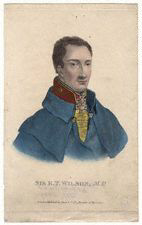Robert Thomas Wilson
| Sir Robert Wilson | |
|---|---|

Sir Robert Wilson
|
|
| Born | 17 August 1777 London, United Kingdom |
| Died | 9 May 1849 (aged 71) |
| Allegiance |
|
| Service/branch | British Army |
| Rank | General |
| Battles/wars |
French Revolutionary Wars Napoleonic Wars |
| Awards | Knight Bachelor |
General Sir Robert Thomas Wilson (17 August 1777 – 9 May 1849) was a British general and politician who served in Flanders, Egypt, Iberian Peninsula, Prussia, and was seconded to the Imperial Russian Army in 1812. He sat as the Liberal Member of Parliament (MP) for Southwark from 1818 to 1831. He served as the Governor of Gibraltar from 1842 until his death in 1849.
Born in London, he was the grandson of a Leeds wool merchant, and the fourth child of painter and portraitist Benjamin Wilson (painter). Orphaned at the age of twelve he was raised and educated by his uncle and guardian, William Bosville, later attending Westminster School.
He eloped in his twenties with Jemima, the daughter of Colonel William Belford. She bore him thirteen children in the following 15 years.
He had a distinguished career in the Army and the diplomatic service. In 1794, as an ensign in the 15th Light Dragoons, Wilson fought in the celebrated Battle of Villers-en-Cauchies where a handful of cavalry smashed a much larger French force. He was made a Knight Bachelor in 1801. In 1804 he became a lieutenant-colonel in the 19th Light Dragoons. He was expelled from Russia as a spy after the Treaty of Tilsit. During the Peninsular War he organized Portuguese soldiers into the Loyal Lusitanian Legion. During the British retreat from the Iberian peninsula in January 1809, Wilson refused to comply with the withdrawal and instead decided to oppose the incoming 9,000-man corps commanded by the French General Pierre Belon Lapisse. He installed half of his 1,200 Lusitanian Legion in the fortress of Almeida and arranged the rest in a thin screen. He then harried the opposition with such remorseless energy that Lapisse, convinced he was confronted by a far more numerous enemy, switched entirely to the defensive. In summer 1809, Wilson's Legion again formed an important part of the Anglo-Portuguese network of advance posts and was placed on the Spanish frontier to provide early warning of French moves while the British commander Wellington advanced on Oporto. In Wellington's advance on Talavera in spring 1809, Wilson's Lusitanians again formed a valuable flank guard. In the aftermath of the Battle of Talavera, when the French General Victor and his corps threatened to cut Wellington's forces off from the south, Wilson's small flank column of 1,500 men surprised Victor's 19,600 men from the north. In the face of this unclear threat, Victor panicked and precipitously withdrew to Madrid. On 12 August 1809, Wilson with 4,000 men, including two battalions of the Legion, was defeated by French forces under Marshal Michel Ney at the Battle of Puerto de Baños. Facing treble the number of French, Wilson nevertheless managed to maintain his position for nine hours. He lost nearly 400 men while inflicting 185 casualties on the French. Wilson returned to Russia in 1812 as a liaison officer. He was a sharp observer during the events of Napoleon's disastrous retreat from Moscow and was present at the Battle of Krasnoye. He also assisted in the November 1815 escape of the Bonapartist Lavalette from Paris.
...
Wikipedia
